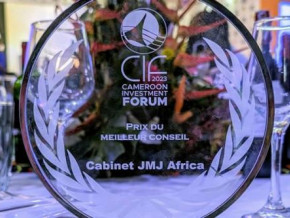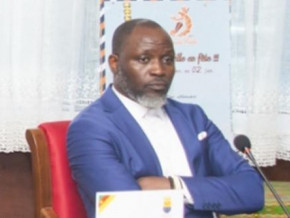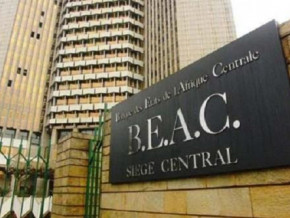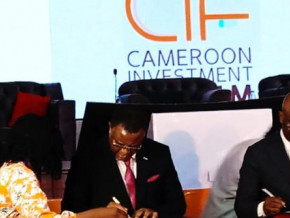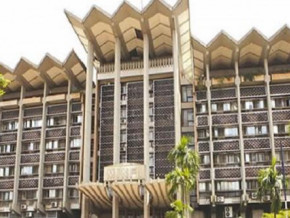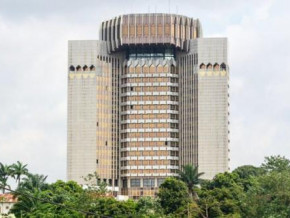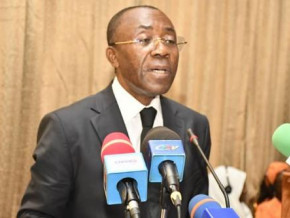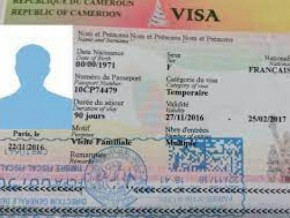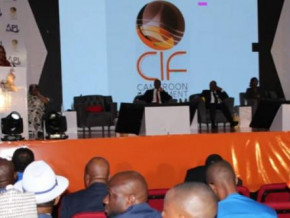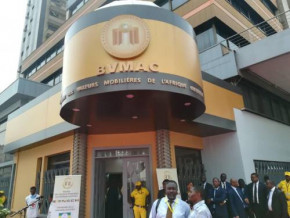
Lawyer Akere T. Muna: In Cameroon, “we have corruption fighting techniques that I find audacious”
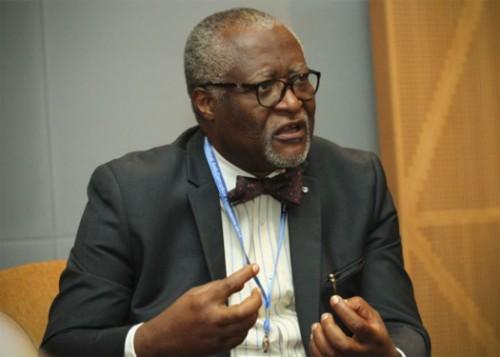
(Business in Cameroon) - The famous cameroonian lawyer, ex-Vice President of Transparency International and ex-President of the Economic, Social and Cultural Council (Ecosoc) of the African Union (AU), maintains that Cameroon is and remains a country full of potential, despite occasional governance or corruption problems.
Why a lawyer such like you, active in the Governance and justice fields, is involved in the ICT sector to the point of organising a forum on this topic on 19 November in Yaoundé?
I believe that ICT can play a role in governance. I got interested in ICT because of the eProcurement programme of the government implemented by the ministry of Public Procurement. This is in truth something I have been asking for a long time. The eProcurement system will abate all doubts connected to the national public contract awarding system. You have recently been made aware that some civil servants have four registration numbers. In my opinion, ICT could solve at least 60% of the governance issues. Including the associated corruption. That is why I am interested in this matter.
On the legal side, for example, I sometimes send a lawyer from Yaoundé to Maroua to get a court order. However, in the USA, most court orders are available online. From Cameroon, I can be in Yaoundé and get the court orders from the USA in minutes. Do I have to leave Yaoundé to file some documents in Maroua? Only to get a response after two weeks. However, I could easily do it all online. ICT are here to make like easier. How can ICT help us? How can ICT become a growth engine ?
Having ministries invest in a unique and common way in the ICT sector will improve the current situation. I am not an ICT expert, but we are not inventing anything. Through this forum, nous hope to determine what we can do immediately to develop the Cameroonian potential in terms of ICT.
In your opinion, how should the government support young innovators in the ICT field?
Every time the Indomitable Lions or Lionesses are playing, we hear about bonus payment problems. What is preventing us from rewarding excellence without problems? We should have a real system which values excellence in youth in various sectors of sports, artistry, etc. This is what pushes people to improve. When we see what people can do with ICT today throughout the world, one can wonder why we are not really supporting our innovators. What are the IT software we have created, the applications? We have streets still without names. How could ICT help us manage that? There are Cameroonians who know how to do that, who can find solutions to these issues. These are so many questions which should interest the public authorities.
At the end of the forum on ICT you organised, you suggested harmonising the ministries policies in term of ICT. What could be the impact of such a measure?
Let us take an example! In the identification process for mobile telephone subscribers, if a Cameroonian registered with a fake identification card, how would the mobile operator know whether it is a fake ID? If there was a device enabling MTN or Orange to enter your name in the system for verification, it would be so much easier. What is preventing from having a system where the national ID card issued by the police, the car registration, the land title if you have one, the driving licence, your taxpayer ID, all issued by different ministries, will be available on a unique platform. If someone goes to the town hall to request for a death certificate to take the money from your salary, the database will notify that a salary is being paid to a dead person and the payment will be interrupted.
I just attended an event organised by the Medical Association of Cameroon and its president said that there are doctors who have signed death certificates to enable families to have access to life insurance premiums. There are people who falsify medical certificates stating that people were sick when they were not. When there is a system where ministries are interconnected, it is difficult for fraudsters to manage through it and makes life very easy for people who comply normally.
Especially when the government has a ministry in charge of primary education, another in charge of secondary education, another in charge of tertiary education, etc. I am sure that there is a way to interconnect these ministries to facilitate the life of regular citizens who are being somehow penalised. I think that IT and ICT will really help us a lot.
Should the populations be afraid of ICT because of personal data which are today available to the digital economy operators?
It is true that some of my generation are afraid of ICT. I remember when in 1973 I was coming back to Cameroon for holidays. I brought a small calculator from the USA for my father. He took 10 digits that he added and multiplied by working it out by hand, and then did the same operations with the calculator. Only after that did he tell me: “Wow! Your machine is really correct!” You see, this is a culture, a period, a reflex. I simply think that there is a learning process to go through. And we are lucky that people become confident when they see that others are getting with thanks to ICT.
Personally, I think if we do not catch up with ICT now, we will be left behind. It is not because people do not master ICT that they should think it is not important. It is dangerous to think like that. We must have a clear policy in terms of ICT and we have to put the experts in charge of it. It is true that there will always be corrupt people to be weary of. We just have to take the necessary measures in order to avoid the mess they create.
You have been to many countries thanks to your various international positions. What are the best initiatives in terms of ICT which left an impression on you and which could be replicated in Cameroon?
I will the example of Rwanda, starting with a story. It was on a Saturday and I had to urgently go to Rwanda on Monday for an important appointment with President Kagame. While I was wondering whom I should contact directly to quickly get a visa, I was simply told: “Go online and request for a visa”. I then applied only and on Monday, once at the airport, paid USD 50 and that was it. It was extraordinary! In less than 10 minutes, all was done. We could implement this system in Cameroon. They already have it in Côte d’Ivoire, Senegal, and recently Gabon.
The other thing that impressed me in Rwanda, it is the declared intention of the public authorities to follow a certain path. This helps the populations understand that this is the way forward. And when a decision is taken, it is implemented. In Cameroon, we are constantly under the impression that when a policy is set up, at the beginning, it is optional. When people see that it is optional, they start complaining, when they complain, it is decided to suspend the policy for one or two years, and then we give it up. You know for example that in Rwanda there are no plastic bags. When you get to the airport with a plastic bag, they take it away. You will not find a single plastic bag in Rwanda. Kigali is very clean!
In the current state of affairs, shouldn’t the State allow other mobile operators to install optic fibre?
In the age of competition, a player cannot be a referee. If Camtel is building the optic fibre infrastructure and at the same time marketing it to operators and subscribers and it has its preferred partners, it is not possible. The higher the cost of the optic fibre, the higher the price charged to the user. There is a need to open the market or even create as suggested by some experts, a structure to manage the infrastructure. There is a need for real referees.
Is the government policy in terms of ICT likely to encourage investments in this sector?
No. The biggest issue I have is when I am talking with foreign investors. They always say they do not understand Cameroon. I had a client who wanted to quickly set up a company because he had a application to make. We were ready in 2-3 days. The statutes were ready, the notary worked fast. But, when it was time to get the registration certificate, we were told: “No. This is a foreign company, you need to get approval”. We go back to the Trade Ministry to apply for the approval. We lost 2-3 weeks.
At the same time, the government is fighting to get a better ranking in the Doing Business. This year, we went further down the ranking. I wonder how one can want one thing and its opposite at the same. There are countries such as Senegal and many more, where in 24hours you can register your company. It is possible. What is a company really? It is just about being identified as practicing a certain type of trade. When it is time to pay taxes, they know who you are and what you do. You can know who the promoters are.
You are known as the person who put Cameroon twice in a row as the most corrupt country in the world in 1998, while you were working with Transparency International, which even earned you some enemies. What is today your view on the progress of the fight against corruption in Cameroon?
When we were first ranked as the world’s most corrupt country, this ranking led me to create the Cameroonian sectionof Transparency International. Then, we were certified, we went to the Board to be elected Vice-President of Transparency International. In the very first ranking, 99 countries were listed. We were the first, the most corrupt country. This happened 2 or 3 more times. It was at this time that I invited in Cameroon Dr Heigen who was then president of TI. When I was talking about corruption in Cameroon, I was labelled as an opponent to the regime. I lost clients who were here to deal with the State. But, I persisted and we created the corruption fighting ad hoc Committee.
I even asked why it was called a committee, I was told that “corruption is something that passes”. Today, we have a structure specialised in the fight against corruption created by a law. It is a good thing. If there is assessment to make, I would say that we moved from a period where we putting our heads in the sand to a period where we acknowledge that it is a major problem, an obstacle to development. Even more, we have corruption fighting techniques which I find audacious. When I travel abroad, I always defy people to show me a country in the world with as many senior personalities in prison.
In prison in Cameroon, there is a prime minister, a General Secretary of the Office of the President, many ministers, managing directors of public companies, etc. I do not know any African country with as many senior officers in prison. This thus proves that there is a desire to fight against this plague. But I think the system remains the same. We have a systemic problem and if the problem is not solved, we will remain in the same place. We are progressing on the sanction level, but if the level remains the same, we will still be dishing out sanctions. For example there is article 66 of the constitution on the disclosure of assets which has still been implemented for over 20 years. I think we should concentrate more on prevention and prevention happens through a thorough cleaning of the system. We need to audit the system to be able to move forward. Otherwise, the same causes will generate the same effects.
What do you say to those who think that jailed senior officials are political prisoners and not corrupt people, or that they have misappropriated assets of the State?
My answer to this question is simple. If you think you are in a bad political situation, be careful, because when we start looking for corrupt people, this will be a good reason to catch you. I had a client about 25 years ago. I went to visit him in prison, I found him handcuffed and shaved. He was a respected senior official in prison. In fact, he was drinking too much and had reprimanded the prison guards. He was then treated as the violent prisoners. Before that, he was subjected to a body search. What was found in his pocket? A pack of Indian hemp. When I met, I told him: “according to you, you are here because of political reasons. But the guys here who are accusing you have a very good reason now with this pack of cannabis. They are forgetting the accusations and taking this to condemn you”.
So, it is true, in this kind of environment, if you are in a bad position with the power, you will be caught. It is possible that some people are there for political reasons. I do not know. But, there are real cases of corruption and in such an environment, you have to be careful (…) I am not saying that it is too bad for those innocents who have been jailed. I am saying that it is impossible to not have such cases (…)
How does one move from being a lawyer abhorred by the State, because he denounces corruption, to being a lawyer the interests of the Cameroonian State in the USA?
I am a lawyer and if a client retains my services, I do my job. But, many Cameroonian prisoners have asked me to defend them, I refused. Because, in the current state of affairs, I am Cameroon’s lawyer. So, I cannot be lawyer of Cameroon on the one hand and defend those who have accused of misappropriation of public funds on the other hand. Moreover, I had similar problems in Nigeria. At the beginning of my work with Transparency International, I had problems with TI. Because, I was retained by the Abacha family in the trials against Mohamed Abacha. I had to drop the case three months later simply because of this conflict of interest.
So, as a legal defence for Cameroon, we are working without problems. I do not any issues with the activities I partake in as a militant of the civil society and the practice of my profession of lawyer. A journalist once asked me: “How can you be part of delegation from the State of Cameroon going to the USA to convince investors to come to Cameroon?”. I replied: “you have completely missed the point”. I go out every 20 May (Labour day in Cameroon) to the Boulevard du 20 Mai. I see all these young job seekers. If you send me to the USA to talk to businessmen and encourage them to come invest in Cameroon, I will go. Our country is a country full of potential. And it is true! I will tell them. And if I am told, your country is corrupt, I will reply that is why I want you to come.
Because, the more you will invest in a country, the more people you will reach, the more the public authorities will think that if you leave, the losses that the Treasury will account for due to taxes will increase. So this will create a bigger lobby. If big companies like Google, Facebook and others get established in Cameroon, and 30% of taxes come from them, who will be the first to benefit? I am not even talked about the jobs they will generate. So let us be careful!
In Indonesia, army generals had misappropriated funds. Huge sums. You know what they did? They invested in their own country and built factories. When the fight against corruption started, nobody wanted to go after these generals. Why? Because they had become heavyweights, some employing 5,000 people, others were having 10,000 employees, some even 25,000 employees. But, in our country, we do the opposite. Our brothers, when they steal from the State, it is to build a castle in their village where nobody lives, or to stash the money in tax havens.
Propos recueillis par Beaugas-Orain Djoyum
Mags frontpage
- Most read 7 days
- shared 1 month
- read 1 month



